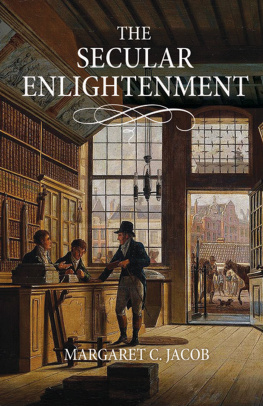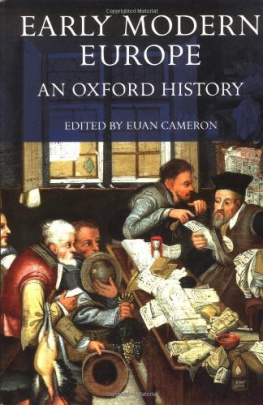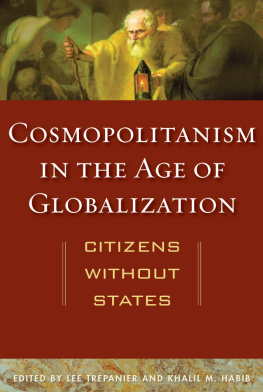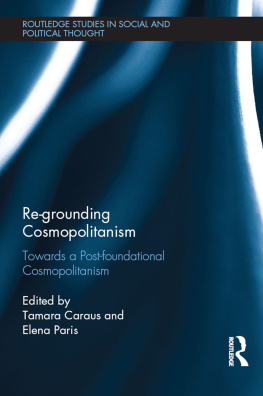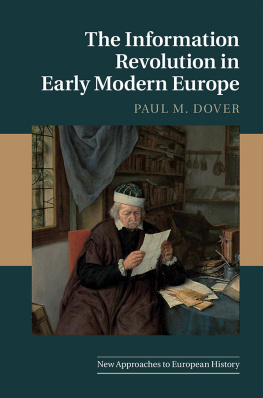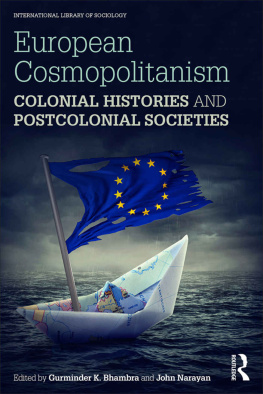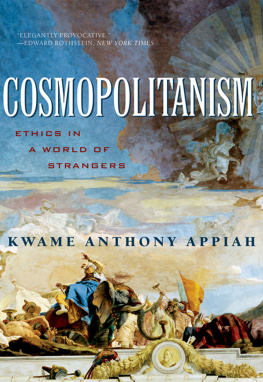Jacob - Strangers nowhere in the world the rise of cosmopolitanism in early modern Europe
Here you can read online Jacob - Strangers nowhere in the world the rise of cosmopolitanism in early modern Europe full text of the book (entire story) in english for free. Download pdf and epub, get meaning, cover and reviews about this ebook. City: Europe;Philadelphia, year: 2006;2016, publisher: University of Pennsylvania Press, genre: Religion. Description of the work, (preface) as well as reviews are available. Best literature library LitArk.com created for fans of good reading and offers a wide selection of genres:
Romance novel
Science fiction
Adventure
Detective
Science
History
Home and family
Prose
Art
Politics
Computer
Non-fiction
Religion
Business
Children
Humor
Choose a favorite category and find really read worthwhile books. Enjoy immersion in the world of imagination, feel the emotions of the characters or learn something new for yourself, make an fascinating discovery.

- Book:Strangers nowhere in the world the rise of cosmopolitanism in early modern Europe
- Author:
- Publisher:University of Pennsylvania Press
- Genre:
- Year:2006;2016
- City:Europe;Philadelphia
- Rating:3 / 5
- Favourites:Add to favourites
- Your mark:
- 60
- 1
- 2
- 3
- 4
- 5
Strangers nowhere in the world the rise of cosmopolitanism in early modern Europe: summary, description and annotation
We offer to read an annotation, description, summary or preface (depends on what the author of the book "Strangers nowhere in the world the rise of cosmopolitanism in early modern Europe" wrote himself). If you haven't found the necessary information about the book — write in the comments, we will try to find it.
Jacob: author's other books
Who wrote Strangers nowhere in the world the rise of cosmopolitanism in early modern Europe? Find out the surname, the name of the author of the book and a list of all author's works by series.
Strangers nowhere in the world the rise of cosmopolitanism in early modern Europe — read online for free the complete book (whole text) full work
Below is the text of the book, divided by pages. System saving the place of the last page read, allows you to conveniently read the book "Strangers nowhere in the world the rise of cosmopolitanism in early modern Europe" online for free, without having to search again every time where you left off. Put a bookmark, and you can go to the page where you finished reading at any time.
Font size:
Interval:
Bookmark:
Strangers Nowhere in the World
The Rise of Cosmopolitanism in Early Modern Europe
Margaret C. Jacob

Copyright 2006 University of Pennsylvania Press
All rights reserved
Printed in the United States of America on acid-free paper
10 9 8 7 6 5 4 3 2 1
Published by
University of Pennsylvania Press
Philadelphia, Pennsylvania 19104-4112
Library of Congress Cataloging-in-Publication Data
Jacob, Margaret C., 1943
Strangers nowhere in the world : the rise of cosmopolitanism in early modern Europe / Margaret C. Jacob.
p. cm.
ISBN-13: 978-0-8122-3933-1 (cloth : alk. paper)
ISBN-10: 0-8122-3933-4 (cloth : alk. paper)
Includes bibliographical references and index.
1. CosmopolitanismEuropeHistory. 2. TolerationEuropeHistory. 3. EuropeMoral conditionsHistory. I Title.
HN380.Z9 M645 2006
306.094'0903dc22 2005058499
In memory of Richard F. Hunt,
a cosmopolitan gentleman
Being cosmopolitan in Europe during the early modern age meantas nowthe ability to experience people of different nations, creeds and colors with pleasure, curiosity and interest, and not with suspicion, disdain, or simply a disinterest that could occasionally turn into loathing. This benign posture, whether toward foreigners or disbelievers in ones own religion, did not come aboutthen or nowautomatically, or even easily. It happens when circumstances or situations, times, and places exist that are propitious. In other words, such a varying stance in the world possesses a history, and this book seeks to recapture aspects of it. Focused on Europe from roughly 1650 to 1800, the chapters ahead take their definitions of the cosmopolitan from what those contemporaries said, as well as inevitably from our own lived experience.
We can recognize the early modern words used to describe the cosmopolitan as now being a part of our own idealistic vocabulary. Cosmopolitans, as French philosopher, Denis Diderot, put it in his encyclopedia of 1751, are strangers no where in the world. By the second half of the eighteenth century the word, and the ideal, had become commonplace.
Then in the 1790s the implications of cosmopolitan mores received a novel treatment and were given international dimensions. The German philosopher Immanuel Kant created a political agenda for the Western nations by proclaiming the cosmopolitan acceptance of all peoples to be a necessity. It would become, he said, the foundation for a perpetual peace among nations. Their writings forcefully associated cosmopolitan values with the impulse for political reform. As we shall see in the chapters ahead, they were right to see the linkage, to assert that certain political conditionslong associated with democratic republicsmade cosmopolitan mores happen more easily. By the 1790s a century of experimenting with constitutional systems of governance in Britain, and the growing realization on the Continent that monarchical absolutism was doomed to failure, made cosmopolites certain that democracy, and the revolutions that were then promoting it, lay in their interests. In societies where nationalist pressures mounted by the year and would soon lead to the Napoleonic Wars, a few visionaries longed to transcend those profound rivalries.
I am not suggesting an early, until now unnoticed history of the ability to think about other people ethnographically. I am not wishing us to pretend that the same Europeans who could on occasion mix amicably at home with the foreign or dream of perpetual peace did not also practice the slave trade abroad. But I am saying that in certain early modern circles and settings, with motives that could range from millenarian Protestantism to the desire for profit, some Europeans approached those distinctly different from themselves hospitably, with a willingness to get to know them, even to like them. From at least the sixteenth century such an expansive person was termed a cosmopolite, best defined as a citizen of the world.
Vagaries will always surround the word, and all we can do is provide a few examples of its usage. From 1600 to 1800 writers in search of universal fellowship and human rejuvenation, sometimes through medicine and alchemy, signed themselves cosmopolite. Others who decried the treatment of minority religions, in one case the massacre of French Protestants during the wars of religion, shielded their identity under the anonymous label, cosmopolite.
Now, early in our new century, we reject the indictment. Regardless of Cities afford daily experience of people whose customs and skin color announce their differences, and most of the timeand most peoplestrive to be accommodating, even hospitable. Yet tensions also mount in European cities as their original inhabitants react bitterly to the foreigners in their midst. At moments these reactions to foreigners, especially of Moslem background, resemble the tensions of white and black Americans who have struggled for a century and more to cohabit urban spaces peaceably. Having a historical perspective on past experiences of the different and the foreign may put some of these struggles in perspective.
Yet even when being successfully cosmopolitan very little is known about why and how the ideal arose in the West. Why did early modern theorists or pundits seize upon the notion of cosmopolitanism as a form of virtue, one that would make Europeans hospitable to foreigners, comfortable among people of different religions, or simply eager to socialize outside of kirk or kin, among relative strangers? Clearly commerce made people imagine a wider world, but mercantile life is only part of the larger story of how and why some Westerners began to think in cosmopolitan ways.
An interrogation of places and people from the seventeenth and eighteenth centuries helps us better understand how a cosmopolitan idealism became thinkable, if not fashionable. A few places to launch this inquiry are fairly obvious: both science and merchant life have long been associated with inculcating a cosmopolitan affect. As we shall see, both associations have merit, but need qualification. Such nuancing is possible because a different kind of history, one here focused on practices and social experience, qualifies what once had been taken as truisms about why some Europeans began to think in cosmopolitan ways. International commerce helped but, as we shall see, the potential of mercantile exchange to instill cosmopolitan mores rested on many variables. Science too contributed, but the most avowedly cosmopolitan voices in its early modern camp were often alchemicalnot the first practitioners who come to mind when we think about the scientific.
Such varying conditions and unexpected participants cannot be accessed by writing yet another intellectual history of the cosmopolitan ideal. There already exist excellent accounts of writers and philosophers, largely from the early modern period, who wrote idealistically and learnedly about the cosmopolitan.behaviors, social habits, mores from the quotidian long past, that may offer insight into the circumstances that made the cosmopolitan sometimes more, other times less possible. Sometimes contemporary witnesses spied what the eye of the historian sees and used the terms cosmopolitan or cosmopolite to call attention to what they were doing, or advocating. Alchemists were particularly fond of invoking the term, of crossing any border in search of their illusive treasures. But even when sources do not invoke the word, this book labels as cosmopolitan social practices that others at the time may not have called by that name.
Next pageFont size:
Interval:
Bookmark:
Similar books «Strangers nowhere in the world the rise of cosmopolitanism in early modern Europe»
Look at similar books to Strangers nowhere in the world the rise of cosmopolitanism in early modern Europe. We have selected literature similar in name and meaning in the hope of providing readers with more options to find new, interesting, not yet read works.
Discussion, reviews of the book Strangers nowhere in the world the rise of cosmopolitanism in early modern Europe and just readers' own opinions. Leave your comments, write what you think about the work, its meaning or the main characters. Specify what exactly you liked and what you didn't like, and why you think so.

